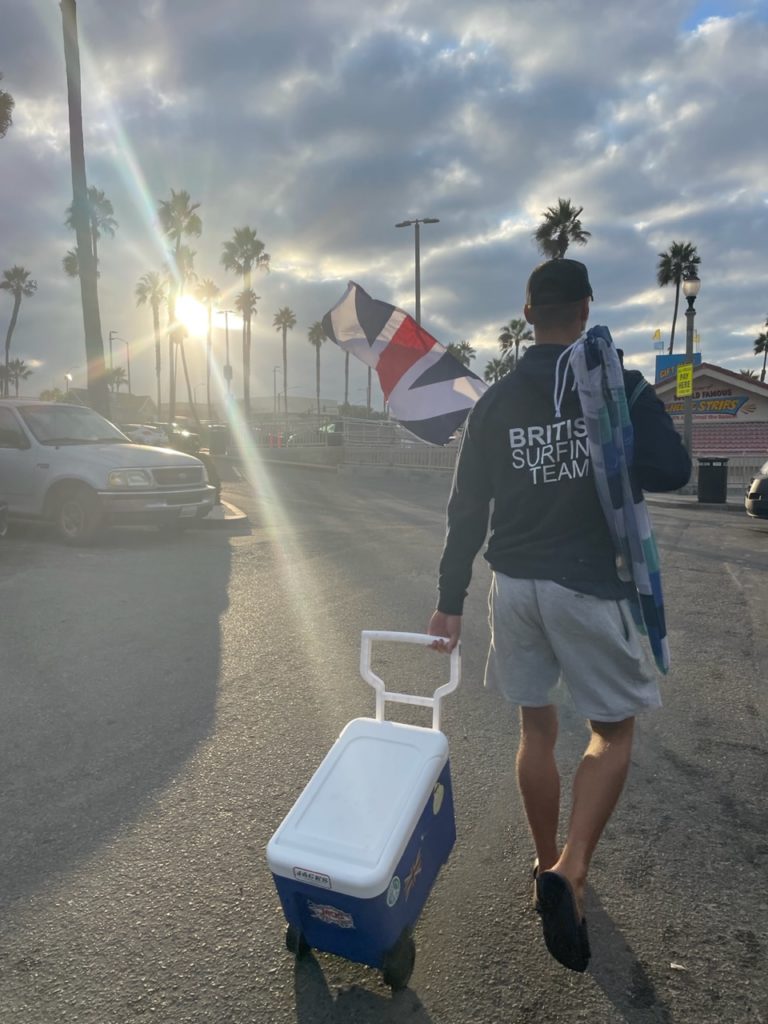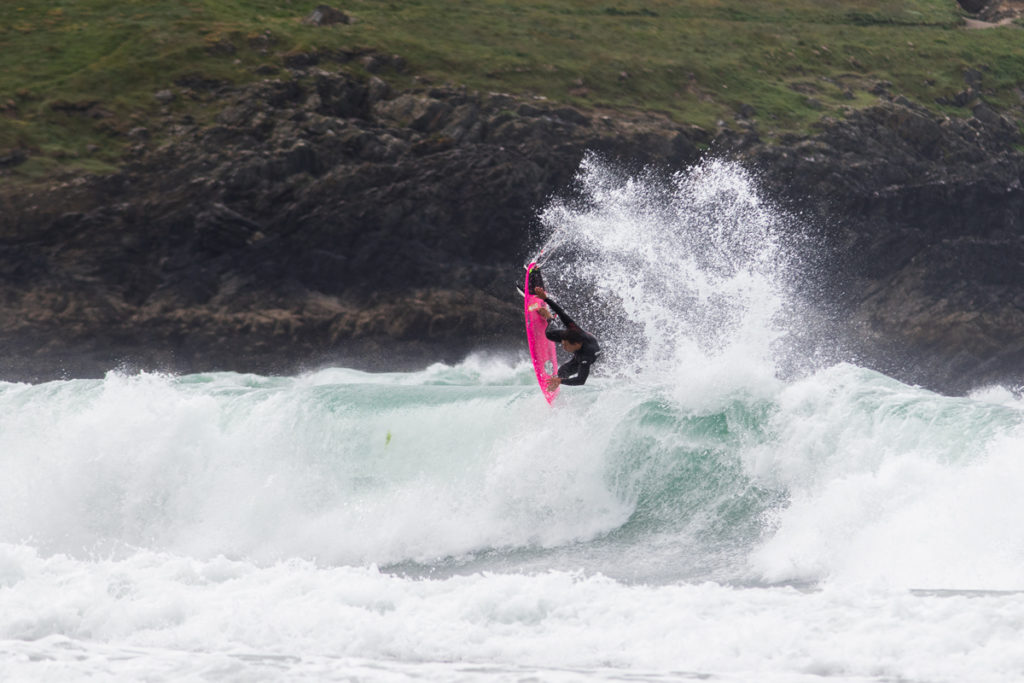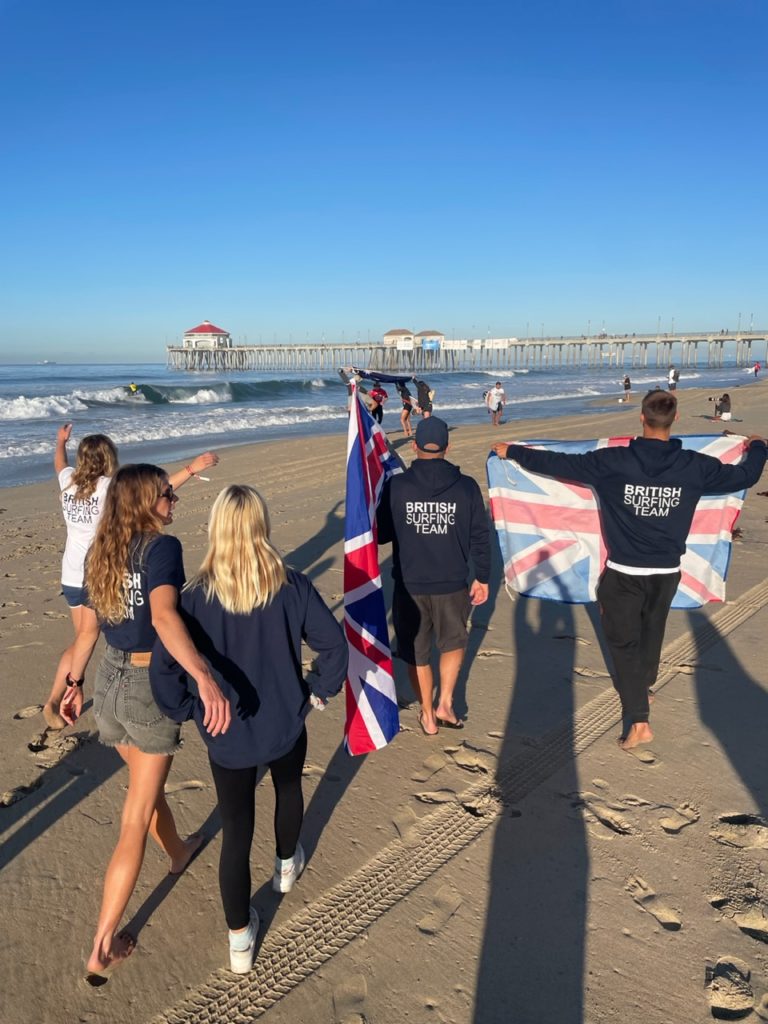Surf coach, Joel Grey, once a vocal critic of British Surfing, has been appointed by the government body to bring UK surfing success. Is it possible? And how will he do it? We talk to him to find out.
Back in 2013, in an introduction to a Reubyn Ash profile for a rival, now defunct magazine, I wrote, “The state of English surfing, at the pointy high-performance end, is atrocious.” I also called most UK ex-pros a bunch of c*nts. I thought it was funny. It wasn’t. Most UK surfers just found it offensive. It was. Skindog threatened to remove my tonsils, through my bottom. I was forced to surf Milook, in summer, in a hood, and in a two-step protection move, muffle my Aussie accent with a mouthguard.
It’s been almost a decade since, and while it is still safer for me to surf Teahupo’o than Porthleven, my main point still stands. The UK has been starved of any real consistent surfing success for a long time. Russ Winter remains the sole CT surfer, and he fell off the elite tour in 2002. No British surfer has won a significant event since Winter’s victory at Thurso in 2006. There are currently no UK surfers in the Challenger Series events. In the ISA World Surfing Games in 2021 Team GB finished 14th, behind Canada and Mexico. All in all, not great.
In 2018, the IOC announced that surfing would be included in the 2020 Olympics. With surfing previously run by the Home Counties, British Surfing was inaugurated and funded by UK Sport in 2019. It was announced that an initial investment of £192,500 would be followed up by a much more substantial £1.35 million.

Last month, Joel Grey, a former pro surfer and now surf coach was appointed to a new role at British Surf. His first gig was to take the British team to the ISA World Games in Huntington in September. We caught up with Mole to see what his role is, the plan for the future and whether there will ever be a UK surfer in the Olympics.
Hi Joel, congratulations on the new gig! Can you tell me what your official role is?
I am the Performance Pathway Manager. The aim is to set up a pathway that covers talent ID, supports and helps co-ordinate the Junior programs of the Home Nations, implements various squads with the ultimate goal of Olympic success. So, the remit goes from what happens with a talented 10-year-old all the way to professional surfers competing on the WSL. There’s a focus on the ISA Games, which is our best chance of Olympic qualification, and also WSL competitive success. I want to see a steady stream of Brits on the Challenger Series and for us to be there challenging on finals day in the ISAs.
And who is employing you?
UK Sport provides the funding, but it is allocated by British Surfing. So that’s effectively who I am working for.
Working previously as a surf coach for some of the UK’s best surfers, you have been vocal about the job, or lack of, that British Surfing has been doing. So is it a case of turning the poacher into the gamekeeper?
Yes, I was frustrated at the inaction at the British Surfing level. It was initially communicated that there was money coming from UK sport, but then it went silent which was frustrating for everyone involved in the scene. I was one of the ones banging on the door and shouting for answers. I wasn’t the only one not getting any.
What changed?
My brief take is that things changed when the new chair, Vicky Gosling, came in and with the board of directors that helped unlock the funding. They advertised for full-time jobs, including mine, plus support staff. We’ve also got Dan Hunt, former Team GB cycling coach, and Team Sky sporting director, to come in as a consultant to assist with the implementation of a long-term strategy. So, it’s the first time there are paying jobs, with a remit and responsibilities and channels for communication. I’ve even got an official email. That’s a huge step.

And what changes have you been able to put in place?
Well, we are just back from the World ISA Games. That was hastily put together and has pretty much taken up all energies thus far. Although in California we didn’t get a groundbreaking result, I’m confident that we created an excellent, professional environment and the surfers were afforded top-level support. It was a good start. And, for next year’s event in El Salvador, we are already planning the logistics. There will be a camp in Portugal in November, plus a training slot at the comp site in El Salvador in April, and a January training camp abroad. We’ll look to bring an online centralised strength and conditioning program, regular coaching, and QS athlete support. All that has never happened before.
So sounds like there’s some money being thrown at it?
Look, the money tap is not huge, but I can say now that it’s running and we have people in positions whose aim is to spend it wisely, and so that we invest in the future. We want to build an aspirational pathway and program that the best surfers in the UK want to be involved in.
In the short term though, can’t you just poach overseas surfers with British heritage? There must be loads if you researched it.
Yes, each Olympic cycle I am expecting to find a few surfers from around the world to find some British passports down the back of some sofas. It’s an inevitable issue that we will have to address with a clear, open strategy. If eligible overseas-based surfers want to join our program, that could be beneficial.

A lot of the top UK surfers were unhappy with the selection process for the various British teams. Will that change?
I think the last few years the teams were based on results from the British Nationals, but I think that will radically change. There will be a new selection policy for the various development teams. Again, the key will be making that process functional and transparent. This will be clearly communicated and in place by the end of November.
Where do you see UK surfing is at right now?
We are not where we need to be. It’s not a situation where we have an Emma Radacanu, or a ready-made elite surfer, so we need to improve the whole skill level and increase their exposure to top-tier competition and locations. Look, we have a strong history of success in Europe and a lot of European titles. However in the last decade, I think we have lagged behind the continent – France, Spain, and Portugal have all moved ahead.
What are the reasons for that?
There are a number of reasons. We have a single, one-star QS on our shores, and there’s no National Pro Tour. So, issues like that are a disadvantage. But there’s so much potential. In the last Junior EuroSurf Championships, Lukas Skinner won the under 16s, Alys Barton won the under 18s, and Arthur Randle won a longboard title. So, I feel the push is there, just waiting. We have some of the best juniors in Europe and I feel the pressure to provide for them. Likewise, when we give support and quality inputs into the current adult competitive surfers we have, I know we will see results.
So we’ll have a UK surfer in the Olympics pretty soon, right?
Ha, that’s the end goal. It’s a process. I’ve been stoked to plug into the UK Sport’s network. The elite coaches and some key players in skateboarding and snowboarding have reached out, as well as other Olympic sports. It’s been energising and encouraging having meetings with other experienced experts from other fields – they all want to help. Our UK Sport resource base is significant. We have so much to learn and implement. It’s just the start, but I believe in the potential of British surfing and we are building a plan to realise it.

